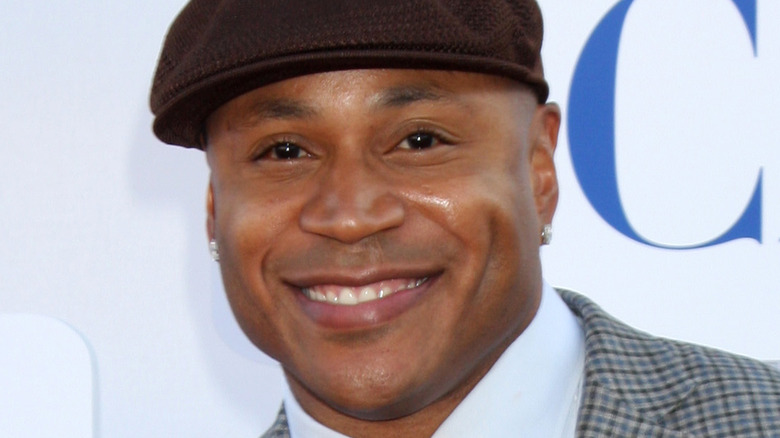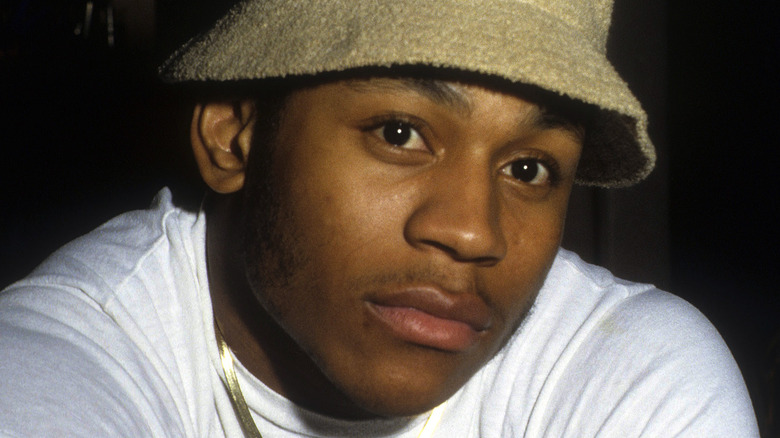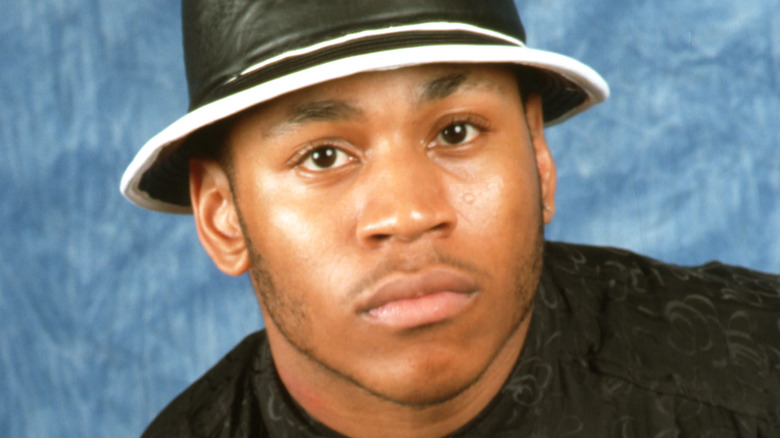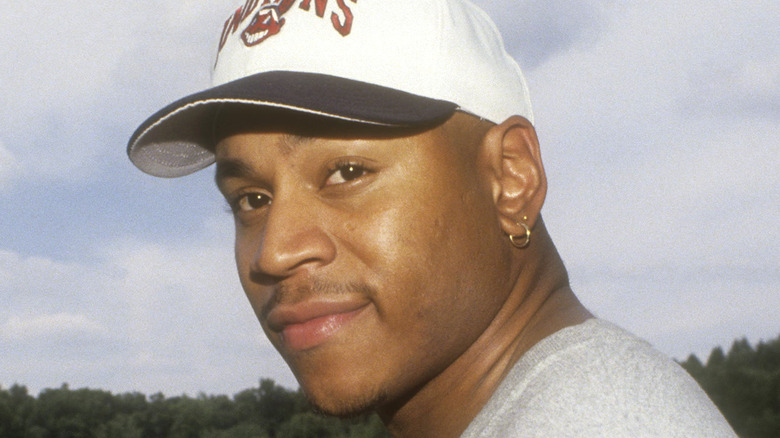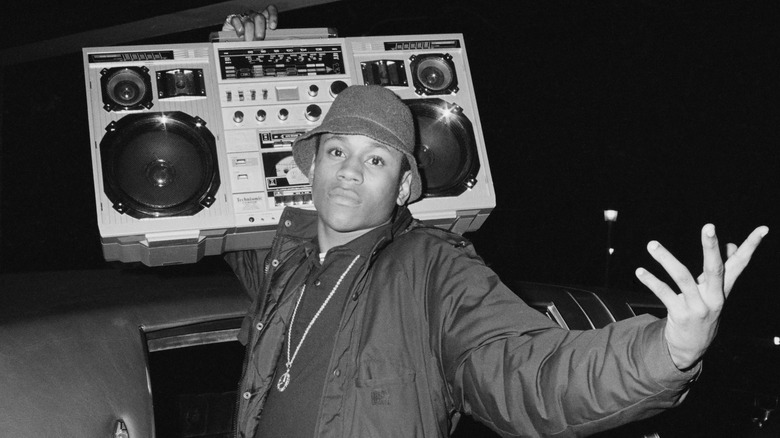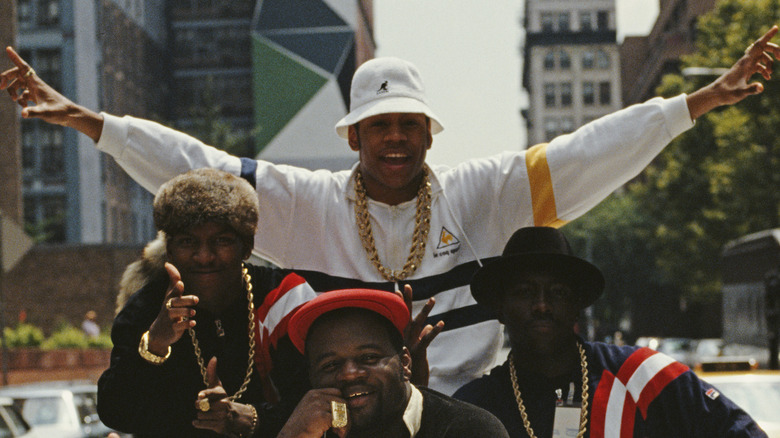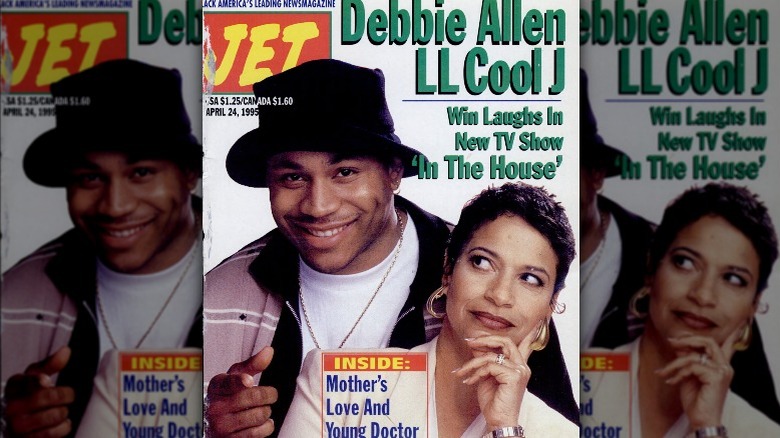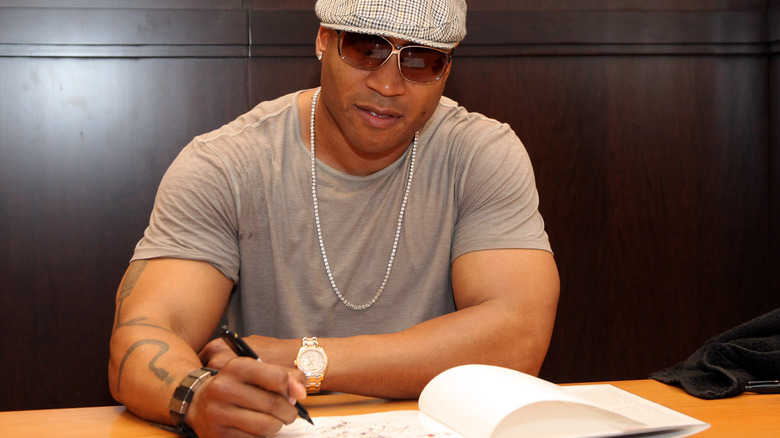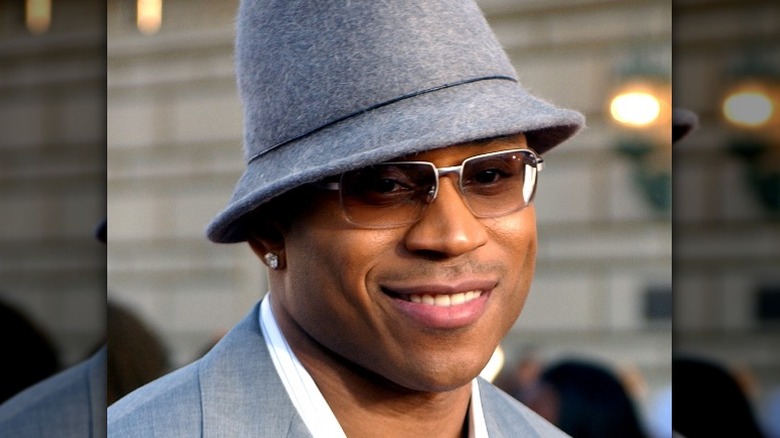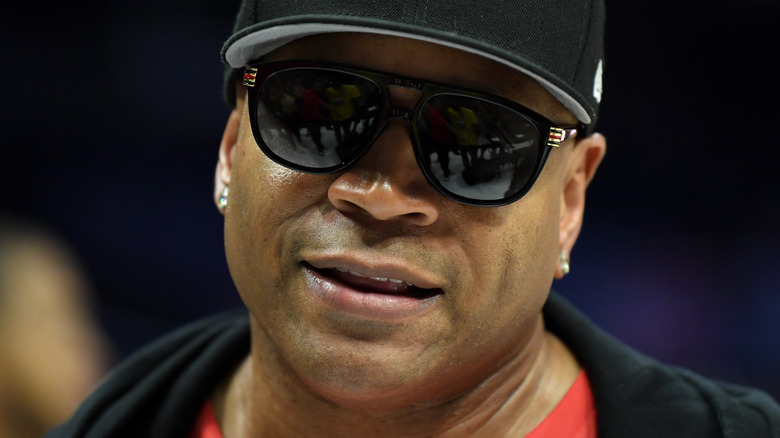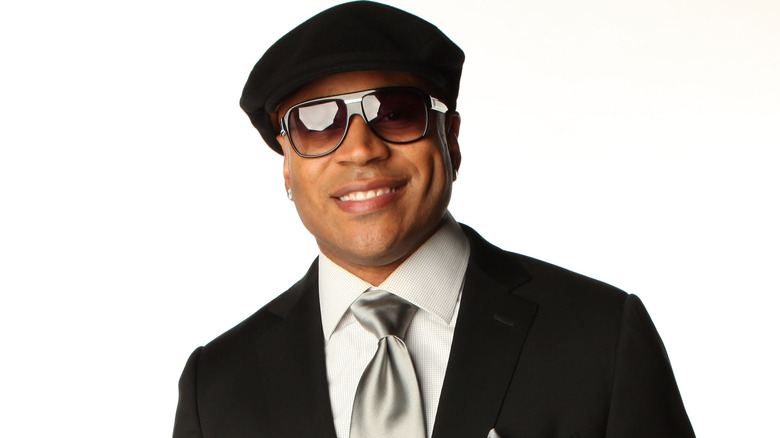Here's How Much LL Cool J Is Actually Worth
LL Cool J may have the longest, most successful career of any rapper. Sure, there are other hip-hop artists whose careers started before his, and they're still performing. But they're probably not as relevant as Cool J within entertainment circles and don't get the same amount of work that he does. The legendary rapper hasn't done too bad in the financial department either. Celebrity Net Worth estimates he's worth $120 million.
But before achieving fame and fortune, the Rock and Roll Hall of Fame inductee was born in Bay Shore, New York, on January 14, 1968 as James Todd Smith. His life began with big challenges while he grew up in Queens. When he was four years old, Cool J's father shot his grandfather and his mother. Per the Chicago Tribune, the shooting was nearly fatal. Cool J then lived with his maternal grandparents, who gave him plenty of love and a good life. "I lived in middle class, my home was middle class," he said during a 1987 interview on "Countdown." "Grass, trees, nice house, Christmas presents every Christmas, lots of Christmas presents."
But don't assume just because Cool J is reportedly worth many millions that his four children have it easy. "I am a stickler for excellence, and I'm not going to spoil you. You got to prove you're worthy of whatever it is you're trying to accomplish," he said about his kids in 2017 on "Oprah's Master Class." So let's take a look at how Cool J made all of that money, and what he's done with some of it.
If you or someone you know is dealing with domestic abuse, you can call the National Domestic Violence Hotline at 1−800−799−7233. You can also find more information, resources, and support at their website.
LL found his calling early on
It can take time for a person to know what they want to do with their life. And even if they figure it out, they may not always get the proper support. But LL Cool J knew exactly what he wanted to do at 9 years old, which was rap. A lot of kids say they want to be entertainers, so what made Cool J's dreams any different and possibly more reachable in his mind? It was his grandfather Eugene Griffith, who bought him $2,000 worth of recording equipment when he was 11 years old, according to The New York Times. Cool J talked about the bond that he and his grandad shared during a 2013 interview with Oprah Winfrey. "My grandfather was a great guy," he said affectionately. "The way he treated me and the love that he gave me [was special]."
Then, on "The Late Show with Stephen Colbert," the native New Yorker spoke of his early interest in rap and how seriously he took it. "In order for you to succeed at anything, you have to be obsessed with it. You have to love it, you have to be passionate about it," Cool J explained to Colbert. "And for me and the guys in my community and my friends growing up in Queens, hip-hop was the biggest thing in the world."
He had a game plan to secure a record deal
Yes, LL Cool J began rapping at 9 years old, but he wasn't content with just performing in his bedroom and using a hairbrush for a microphone. Rap wasn't a mere hobby for him. He wanted to be in the music business, so after his grandfather brought him a microphone, speakers, two turntables, and a mixer, a young Cool J started to make and send out demo tapes. But after multiple rejection letters, discouragement set in, and Cool J quit rapping. That was until his mother used one of her tax return checks to buy him a drum machine, he shared on "Jimmy Kimmel Live" (via HipHopDX).
The ambitious youngster said in "Def Jam Recordings: The First 25 Years of the Last Great Record Label" (via GQ) that at age 14, he specifically sent a demo to Rick Rubin, who had just produced T La Rock's "It's Yours." The clever Cool J got the label's address off of the single's cover. His demo was intercepted by the Beastie Boys' Ad-Rock, who passed it on to Rubin. Rubin liked the tape and eventually met with Cool J. From there, they made the song, "I Need a Beat" and gave it to Rubin's partner Russell Simmons. At the time, both of them were starting the now-legendary record label Def Jam, and "I Need a Beat" was the first song they ever released. Now it was official. Cool J's career was off to the races and he had a darn good lead.
LL Cool J said goodbye to high school
Unlike a lot of artists' first single, LL Cool J's "I Need a Beat" found success and was being written about by major publications like Billboard. So now with his rap pursuits finally paying off, Cool J dropped out of New York's Andrew Jackson High School, despite the rapper getting good grades (according to The New York Times). His mother always prompted him to work hard at his studies, he told ET. Who knows? Maybe his mom wanting him to excel in school is why he got himself a tutor after his career took off.
Since "I Need" a Beat" did well, it was time for Cool J to record his debut album. That meant the rising star wouldn't return to Andrew Jackson High, but ironically, he still wore a cap and gown. It wasn't for his high school graduation, though — it was for a ceremony at Northeastern University after receiving an honorary doctorate degree from the school in 2014. What was probably even sweeter for the rapper is that his daughter Italia Smith graduated on that same day.
He has the film Krush Groove to thank
LL Cool J's debut album "Radio" was released in November 1985, and its first single was the hard-hitting "I Can't Live Without My Radio." The song received plenty of radio play, and the LP sold 1 million copies, a huge feat at the time. This was before Sean "Puffy" Combs and Suge Knight sold millions of records through their respective Bad Boy and Death Row labels, which made it almost commonplace during their reign for rappers to go platinum.
As for Cool J, he had a film called "Krush Groove" to help move his first single and album. The beloved rap flick, released in 1985, was loosely based on Rick Rubin and Russell Simmons starting Def Jam. It undoubtedly upped Cool J's profile and brought attention to "I Can't Live Without My Radio," which he performed for a few seconds on screen. In the film, Cool J plays a rapper auditioning for Def Jam, which probably left many wondering who the charismatic kid in the sky blue Kangol was.
"My part, I didn't think, you know, that so many people was going to take to it when I said 'box,'" explained Cool J during a 1985 interview on New York station WBLS. The rapper was referring to the sole line that he had in the film, considered by many to be a classic scene as well as a major hip-hop moment.
LL Cool J became a star rather quickly
By the time 1987 rolled around, LL Cool J was a star who was shining in two areas of entertainment. As stated, his debut album went platinum and he'd already appeared on the silver screen. So to many, it probably wasn't a huge surprise that his second album "Bigger and Deffer" did even better, selling 2 million copies in the U.S. in six months, per Cool J's Rock the Bells website. The rapper was still in rare company. The first single off his LP was "I'm Bad," an in-your-face offering that displays Cool J's ability to skillfully brag for nearly five straight minutes. The song became a mainstay on radio, while the video received heavy rotation on television.
But it was Cool J's second single, "I Need Love," that would change rap history, since it was the first rap ballad ever released. It also peaked at number 14 on Billboard's Hot 100 chart and came with an ultra-popular video. Likely, the romantic tune put more dollars in Cool J's pocket from sales and performances since it's become one of his most well-known songs throughout the years. But as successful as Cool J became after that sophomore album dropped, he got even bigger and secured more money-making opportunities as time went on.
His acting career took off
"Krush Groove" wouldn't be LL Cool J's only film — one year later he appeared in "Wildcats," starring Goldie Hawn. Then, once the '90s hit, his acting career took off like a bottle rocket, with Cool J appearing in "The Hard Way," starring Michael J. Fox, and scoring a bunch of other roles. The Young Legend in Leather even helmed his own sitcom, "In the House," where he played a former pro football player who rented his home to a single mother and her children. The budding actor told Jet that he was excited at the prospect of working with renowned producer Quincy Jones and co-star Debbie Allen. Interestingly, he also said, "I try to be spiritually centered and focused as I can be, to create an atmosphere that is going to be positive and manifest positive things in my life."
In 2009, Cool J began playing Special Agent Sam Hanna on "NCIS: Los Angeles," which he's still doing as of this writing. In an interview posted to YouTube by The Canadian Press, he said after joining the CBS drama, music played a smaller role in his life. "At the time when I started this show, I had been doing music the majority of my life, and primarily that was my priority number one. I was acting as well, but music was first in line in terms of priorities," said Cool J, who added, "It ended up really putting my music on the back burner for a minute and becoming my priority."
LL is an author
For much of his career, LL Cool J has been known to sport various colored Kangol hats, but he wears other hats as well since he has various jobs and sources of income. Besides earning rap dollars and getting Hollywood checks, Cool J is also an author who has released several books, including "I Make My Own Rules," and a children's book titled "And the Winner Is..."
"I just think there's room for something that's positive in hip hop and someone had to have the courage and say, 'I care about the kids,'" he told "The Saturday Early Show" (via CBS News) in 2002 about "And the Winner Is..." He added, "I hope it teaches them to be confident but not arrogant and at the same time when they lose, not be down on themselves either."
As for his first book, "I Make My Own Rules," Cool J told the Chicago Tribune in 1997 that writing it was therapeutic for him and it allowed him to face some of his wrongdoings. On top of that, he talked about wanting to pass on some of the lessons he's learned, while also adding to his finances. "Anything that seems like a marketing ploy, it is," explained the rapping actor. "You think I'm selling albums for free? I'm not. Am I selling books for free? I'm not. I'm trying to help people and at the same time get paid."
He believes that home ownership is important
Where has LL Cool J called home after finding success? Cool J's wife, Simone Smith, told the Long Island Press in 2019, "We raised our children here in Manhasset. New York is always home." The outlet noted that the family was bi-coastal. It is known that they've lived in the pricey neighborhood of Studio City, California. In 2012 it was reported that Cool J caught a burglar in his kitchen and subdued him before police arrived.
For the most part, however, Cool J has done a superb job of keeping his properties under wraps, because there's not much written about them. Home ownership is clearly important to him, seeing that he talked about it in 2006 at the Hip Hop Summit on Financial Empowerment. "Give 10 percent to the church, give 10 percent to your house," he advised.
Singer and reality show star Kandi Burruss said Cool J gave her wonderful financial advice when they were on tour together. "When I was 19 ... I remember he was like a big brother," she told Essence, adding, "I had just bought my first house right before we went on tour and of course, I had a mortgage. He sat me down and said, 'Look, whatever you do, you need to try and pay off your house as soon as possible. ... You always need to have at least one car and one house that you own because in this business, you could be making money and the next thing you know, you're broke and can't afford it.'"
LL reclaimed his Rock The Bells title
Without a doubt, one of the songs most associated with LL Cool J is "Rock The Bells," the third single off his debut album "Radio." So if that's the case, why were promoters Guerilla Union using the title for their very successful and long-running music festival without permission? That's probably what Cool J asked himself before he sued them in 2019 — a lawsuit which he won. In that same year, Pitchfork reported that after the rapper's victory, Guerilla Union wouldn't be allowed to use the "Rock The Bells" title in any form unless given permission. The suit was very much a clean sweep for Cool J, and he took full advantage of it.
As of 2022, not only does Cool J have "Rock The Bells Radio" on SiriusXM; he created a festival using the title, which kicked off in August 2022. Cool J has a "Rock The Bells" website as well, plus, a direct-to-consumer business with the title. Per The Hollywood Reporter, the company had raised $8 million as of August 2021, and Mark Cuban is one of the ground floor investors. Basically, Cool J took what was rightfully his and used it to add more zeros to his bank account.
He pays it forward
Whether it's "Jump & Ball," his charity in his home borough of Queens, New York, that focuses on team building and sports, or his work with the We Are Family Foundation, LL Cool J gives back in a major way. The site Look to the Stars shows that he's also involved with the charitable organization the Diamond Empowerment Fund, which "[supports] programs that develop and empower people in natural diamond communities," as its website describes. Other organizations the legendary rapper reportedly has worked with include Jumpstart, a nonprofit for early childhood education, and the World Vision charity, which helps impoverished communities.
In 2018, Cool J was given the Humanitarian Award by the We Are Family Foundation for the work he's done with young people and "Jump & Ball." He also received the Harvard University Artist of the Year honor in 2014 for all he's done in music and in the lives of young people. "It always feels good to come home and to give back to my community," said Cool J at one of his Jump & Ball events. "...It's become a staple in the community ... This is about bootstrapping. This is about paying it forward... and actually helping your community — me getting off of my tail and actually trying to do something to make their lives better."

